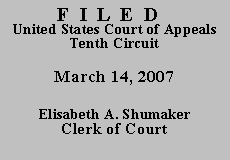

| ALBERT DENNIS ZAMPEDRI,
v.
STATE OF UTAH |
No. 06-4223
(D.C. No. 2:05-CV-139-TC) (D. Utah) |
OF APPEALABILITY
In August 2002, Zampedri was convicted in Utah state court of aggravated attempted murder and attempted murder. He unsuccessfully appealed his conviction to the Utah Court of Appeals. Before that court, he argued: (1) The trial court erred in instructing the jury that the defendant must have acted "knowingly"; (2) Counsel was ineffective in failing to challenge those instructions; (3) Counsel was ineffective in failing to move for a directed verdict because the evidence was insufficient to support the necessary mens rea; and (4) The trial court erred in failing to enter a directed verdict on its own motion. Zampedri then sought a writ of certiorari from the Utah Supreme Court, advancing three claims: (1) Counsel was ineffective for reasons not related to the jury instructions or directed verdict issues; (2) The trial court erred in denying his request to terminate counsel; and (3) A drug-addicted police officer handled critical evidence in violation of state law. The State opposed granting the petition on the grounds that Zampedri did not raise these issues before the Court of Appeals. The Utah Supreme Court denied his petition in a summary order on January 20, 2005.
Zampedri then filed a petition for habeas relief in federal district court, arguing: (1) Counsel was ineffective in failing to object (he did not specifically identify what objections counsel should have made); (2) The trial court erred in failing to provide him with new counsel; (3) A police officer handling crucial evidence was using drugs both before his arrest and during the trial in violation of state law; (4) Other government witnesses engaged in witness tampering; and (5) The prosecution engaged in witness tampering. The district court denied his petition, finding that these claims were procedurally defaulted because Zampedri failed to raise them before the Utah Court of Appeals. See Thomas v. Gibson, 218 F.3d 1213, 1221 (10th Cir. 2000) ("This court may not consider issues raised in a habeas petition that have been defaulted in state court on an independent and adequate procedural ground unless the petitioner can demonstrate cause and prejudice or a fundamental miscarriage of justice."). Further, the district court ruled that Zampedri did not show sufficient cause and prejudice or a fundamental miscarriage of justice to overcome this bar.
On appeal, Zampedri raises the following arguments: (1) Counsel was ineffective in failing to fully investigate the crime scene; (2) Counsel was ineffective in failing to move for a directed verdict and in failing to object to jury instructions that improperly identified the requisite mens rea as "knowingly"; (3) The trial court erred in failing to enter a directed verdict based on insufficiency of the evidence; (4) The trial court erred in using the word "knowingly" when instructing the jury on the mens rea element of the offenses; (5) Counsel was ineffective in failing to inform the trial judge that witness tampering had occurred (which Zampedri argues indicates that there was a conspiracy to convict him); (6) He is actually innocent; (7) The officer handling critical evidence was using drugs in violation of state law; and (8) Police officers perjured themselves during the trial.
A state petitioner pursuing federal habeas relief must exhaust state remedies with respect to all claims presented to a federal court. 28 U.S.C.
§ 2254(b), (c). Zampedri did not present his second, third, and fourth claims to the Utah Supreme Court, and thus has procedurally defaulted those claims. See Dulin v. Cook. 957 F.2d 758, 759 (10th Cir. 1992) (holding that a Utah state prisoner failed to exhaust state procedural remedies by not presenting claims to the Utah Supreme Court). As correctly decided by the district court, Zampedri procedurally defaulted with respect to his first, fifth, seventh, and eighth claims because he did not raise them before the Utah Court of Appeals on direct appeal. See Thomas, 218 F.3d at 1221; DeBry v. Noble, 889 P.2d 428, 444 (Utah 1995) ("Issues not raised in the court of appeals may not be raised on certiorari unless the issue arose for the first time out of the court of appeals' decision."). His actual innocence claim fails because Zampedri has not presented evidence that makes it "more likely than not that no reasonable juror" would have convicted him he has only made conclusory allegations about his innocence in his brief to this court. See Schlup v. Delo, 513 U.S. 298, 327 (1995) (holding that in order for a petitioner to succeed on an actual innocence claim, he or she must demonstrate that it is more likely than not that no reasonable juror could convict petitioner in light of the new evidence).
Accordingly, we DENY a COA and DISMISS Zampedri's appeal. We GRANT Zampedri's motion to proceed in forma pauperis.
Entered for the Court
Carlos F. Lucero
Circuit Judge